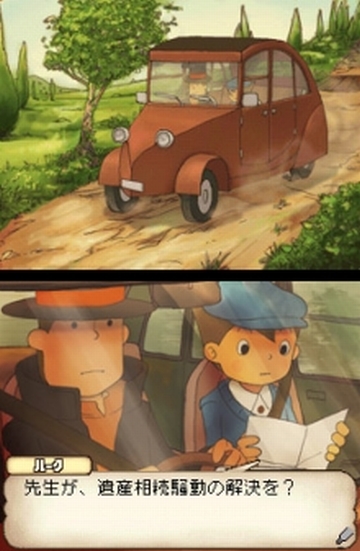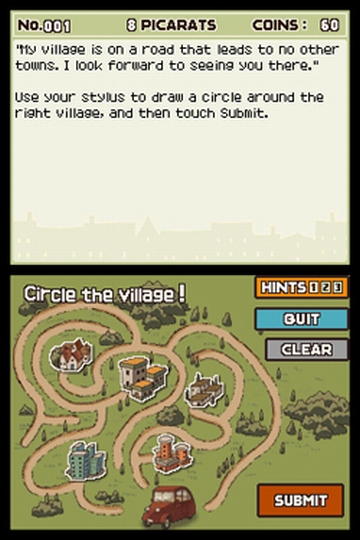Professor Layton and the Curious Village DS Review
To be honest, I still have no idea why these newfangled Brain Training games sell. They are interesting for about 5 minutes, and then repeat the same laborious task into infinity again and again. They have not made me smarter in any way – don’t laugh. I am still useless at Countdown, never able to find anything better than a five letter word. I still fail miserably at the Conundrum, and easily get distracted by Carol Vorderman – although that is not the game’s fault. Then, for one final nail in the coffin, my time with Brain Training really has not helped me sail through the harder parts of Professor Layton and the Curious Village – a game which just happens to be the subject of this review. However, unlike Brain Training I still persist through the game. In fact, I really want to get to the end of this one. So that must mean the game is doing something right.
For those not keeping track, at its heart Professor Layton is a puzzle game. However, it is also one that tells a story. As a result it is more or less an amalgamation of story elements with a 2D point-and-click stylus controlled approach of Phoenix Wright crossed with the grey matter working elements of the Brain Training games. In reality, that is quite a weird mixture, and it really seems like one of those things that should not work. But it does, and works very well in fact. Even better, many of the puzzles on show are tricky, at times even resembling something from an exam paper, but as a result they are very clever, well thought out and extremely satisfying to get to the bottom of.
However, as I said Curious Village is much more than just a puzzle game. It has a fully fleshed out, remarkably well put together and well presented story behind it. This is told with typical Level-5 animatic visual flair, albeit one with a more palatable and somewhat restricted tone than is the norm for the developer. Instead of the vivid colours of Dragon Quest VIII the game adopts more earthy shades, resembling old-style European cartoons. It’s highly reminiscent of the drawing style of the The Adventures of Tintin TV series to be honest.

Along with this the game’s use of voice acting is top notch and in conjunction with the game’s well written script, gives players an exciting game to take part in. It starts out by regaling players with details of Layton’s and Luke’s search for something called ‘The Golden Apple’, but then expands to other aspects as the story advances and they journey through the village of St. Mystere. In truth, it may all sound a bit unusual when described here, but regardless of the slightly eccentric nature of the story the fact that it is so well acted instantly propels the game a few million steps above most other DS narrative efforts as a result. If that’s not enough there is even accordion music, and that cannot be seen as a bad thing in any game!
However, regardless of how well the rest of the game is presented it’s the puzzles that are given to you by the village’s inhabitants that remain the stars of the show. There is certainly a need to stress puzzles (with an “s”) as the game make use of a varying collection of different types to keep things interesting. In typical Crystal Maze-like fashion they are split into different groups, with maths, logic, pictures, and word being the main genres hit upon across the 135 puzzles available as you work your way though the game. Due to not having to solve every problem to advance there is always the option to tackle a different puzzle should one leave you absolutely stumped. Logic and picture based problems were the high point for me. Moving blocks around to release a ball from a maze remained exciting throughout – although the puzzle was overused a few too many times to tell the truth. Moving a certain number of matchsticks to create a different shape was also fun, although slightly more complex, as was being tasked with getting animals across a river in specific groups.
In truth, all of the puzzles have their own distinct appeal, but because of the variety on show there will certainly be some which appeal to different people more than others. For example, my hatred of maths was definitely evident as I played through the game, with some of the algebra based problems making me go bleary eyed with confusion. At times it was so bad I even resorted to grabbing a nearby notepad and scribbling down some convoluted equation – however that still failed me as the equation usually just added up to Numberwang. Regrettably, it’s times like this you start to slightly fall out of love with the game as you get utterly bewildered with something it tasks you with that seems impossible. However, due to a well-integrated hint system – which uses coins you found during searching through environments in the point-and-click section of the game – you’ll never feel forced into doing something long enough for it to annoy. What’s more, towards the end I actually found myself finally figuring out a few of the maths problems that used the same style as the ones which had once confused me earlier in the game. As a result I now hold Professor Layton in higher regard than Mr. Moore – my old maths teacher.

Before closing I have to say the fact that point-and-click gaming seems to be making a comeback which brings a smile to my face. I may be only 24 now, but when I was younger it certainly was my favourite genre, and now after some time apart it is quickly finding a place in my heart all over again. Sure, the games available now may be a different beast compared to what they were way back when, and although recent additions – particularly those on Nintendo brand consoles – focus more on the puzzle elements than telling a story the games are nonetheless immensely likeable. Sure, for this game it does not really make much literal sense that every person you encounter needs you to solve a puzzle for them, but nevertheless it’s an entertaining way to approach the genre, and that what really matters in the end.
So, when all is said and done Professor Layton may not be highly innovative, as it mixes elements from other games and other forms of entertainment, but to some extent it is still a game most of us have never experienced before. Sure, it’s a simple idea done right, but when you realise that’s a characteristic most great games share it shows how special the title is. It’s definitely a great game, there is no doubt about that, and one that most people should consider playing. More so, for those of a particular audience, it could easily be one of the more exciting games released this year.
It won’t top Brain Training’s immense sales, but it’s better in every way.
